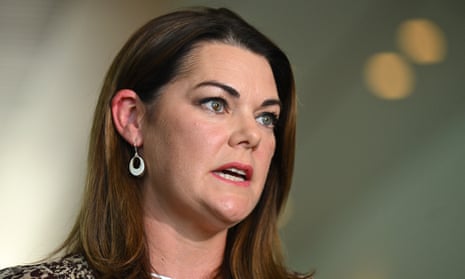Greens say government has ‘utterly caved to fossil fuel lobby’ with new gas strategy
The Greens environment spokesperson, Sarah Hanson-Young, says the government’s new gas strategy shows they have “utterly caved in to the fossil fuel lobby”. In a statement this morning, the senator argued Labor has thrown “any climate credibility out the window” and said:
On the same day the world’s scientists are sounding the alarm that we’re heading off a climate cliff, Labor has slammed it’s foot on the gas, in a naked attempt to pander to big gas …
Only days ago Labor dumped their promise to fix our environment laws to protect wildlife and nature. Today they’ve utterly caved in to the fossil fuel lobby. Labor simply can’t be trusted on climate and the environment.

Key events
Teal MP ‘dismayed’ by government’s new gas strategy
Independent MP Kylea Tink has joined her fellow teal’s in criticising the governments new gas strategy.
In a statement, the member for North Sydney said it was “dismaying” to see the government unveil a gas-led transition plan. She said:
Continued and expanded fossil fuel use is out of step with global climate goals and risks hindering the transition to renewable energy. Locking in gas for decades and encouraging the use of CCS is not a pathway to a sustainable future.
This looks like ‘gas-fired recovery’ 2.0, reinforcing just how beholden to the gas industry our major political parties are.
One thing is clear. Opening up new fossil fuel projects will not help tackle climate change. We need to accelerate the transition away from fossil fuels towards cheaper, cleaner renewable sources of energy. Not open up new gas fields.
Tink said the community is “demanding meaningful climate action” and when it comes to this strategy, she will “dig into the detail and come back with a balanced assessment” for constituents.

Josh Butler
Federal parliament to hold condolence motions for victims of the Bondi Junction stabbing
Federal parliament will mark condolence motions for the Bondi Junction stabbing victims next week, ahead of the federal budget.
A draft program for the House of Representatives, published on the website of the Department of Prime Minister and Cabinet, lists a condolence motion to be discussed on Tuesday.
It will mark the deaths of Yixuan Cheng, Pikria Darchia, Ashlee Good, Dawn Singleton, Faraz Tahir and Jade Young, the six people killed in the Westfield shopping centre attack.
The motion is listed for after 2pm on Tuesday, following the swearing-in of the newly-elected Member for Cook, Simon Kennedy, who won a by-election for Scott Morrison’s former seat last month.
The daily question time will then follow, ahead of the budget speech at 7.30pm.
The draft legislative program shows the House will also debate bills related to illegal logging, the sports anti-siphoning scheme, vaping reforms, digital ID, superannuation concessions and the Net Zero Economy Authority next week.
NSW announces $45.3m in funding to tackle regional health workforce shortages
The New South Wales government has announced $45.3m in funding for healthcare worker accomodation across the regions – one of the biggest barriers to attracting and retaining staff.
Healthcare worker accomodation will be rolled out across Broken Hill, Balranald, Cooma, Finley, Leeton, Narrandera and West Wyalong, according to a statement from NSW’s health minister, Ryan Park.
The accomodation will be provided “close to work” and help support healthcare workers looking to establish themselves in a new community, the statement said.
Park said:
We know recruitment is one of the biggest challenges facing our regional, rural and remote health services … Critical to achieving this has been bringing more health workers to our regions, and these units will support staff looking to establish themselves in a new community.
Thinktank calls for lowering gas demand instead of increasing supply
More reactions are coming in regarding the Albanese government’s new future gas strategy, which has been condemned by environmental groups and independent MPs.
Josh Runciman, the Institute for Energy, Economics and Financial Analysis’ lead gas financial analyst, said:
Though the Future Gas Strategy calls for more gas supply to address ‘shortfalls’, IEEFA’s research finds that cost-effective measures to lower residential gas demand will eliminate the risk of annual and peak day shortfalls in the southern states while also lowering household energy bills. Australian households are locking in $1.2bn in unnecessary costs for each year that new gas appliances continue to be installed.
We do not believe that gas will support Australian industry. As we’ve seen in recent years, a number of major industrial gas users have closed facilities due to challenging gas market conditions despite a focus on new gas supply by Aemo. Lowering residential household gas demand will be more effective in ensuring adequate gas supply for industries that are not yet able to use alternatives to fossil gas.
Our research has found that further gas exploration and development is definitely not needed. Gas exploration expenditure has been falling for the past decade as gas companies pivot to renewable investments or return cash to shareholders. It is unlikely that expenditure will materially increase as anticipated by the future gas strategy.
Police investigate assault on Coffs Harbour woman
New South Wales police are appealing for information after a woman was left unconscious after allegedly being assaulted in Coffs Harbour on the state’s mid north coast.
The 45-year-old walker was struck from behind on Coffs Creek walkway about 6am on Wednesday in what police describe as a “serious assault”.
She was found by two members of the public more than four hours later, at about 10.20am. The woman was treated by paramedics before being taken to hospital for further treatment.
Police are urging anyone who may have seen suspicious activity in the area between 5.30am and 10.30am to come forward.
The alleged attack comes a week after a surfer was allegedly fatally stabbed nearby, metres from Coffs Harbour’s Park Beach.
Police presence in the local area has been increased.
Cashed-up WA to post another big budget surplus
Western Australia’s run of big budget surpluses is expected to continue, with the state government set to inject $500m into heavy industrial use to support critical minerals and green hydrogen production, AAP reports.
The treasurer, Rita Saffioti, will deliver her first budget today, with some analysts predicting the 2023/24 surplus will fall short of last year’s projected $3.7bn and drop below $3bn for 2024/25.
A new Strategic Industries Fund will pump $500m into common-user infrastructure, including roads, power, water and gas connections, the West Australian reported ahead of the budget.
Kwinana will receive a boost of $125m for new blocks in its industrial precinct and a further $40m will flow to Karratha in the state’s north-west, the Peel region, the Goldfields and the south-west for industrial development.
A further $36.4m is earmarked for new measures to cut through green tape and expedite approvals. The premier, Roger Cook, said the government was investing to deliver quality jobs in resources and energy. He told the West Australian:
Our economic strength and natural resources mean demand is running hot for land to set up major job-creating projects, in both our regions and Perth’s industrial heartland in Kwinana.
It will help to lock in WA’s strong economy for decades to come – a downpayment on our kids’ future.
The government has already announced billions of dollars in new spending, including cash to improve the health system and ease the housing shortage and cost of living stress.
Saffioti yesterday flagged more spending to help families, along with housing initiatives and investment in the health sector, but was giving little away.

Peter Hannam
Unscheduled coal plant outages part of NSW’s power stains
So what’s triggered this rare price cap intervention in the wholesale power market? (See previous post)
Anyone living in eastern NSW would know the past week or so has been relatively cloudy and at times pretty calm. That’s been bad for renewable energy output.
Also not helping has been the unscheduled outages at three coal-fired power units. Two of them were at Origin Energy’s Eraring power plant, and the other at Vales Point. (Here’s yesterday’s generation, via the Victoria Energy Policy Centre.)
(Clarifying an earlier tweet.) Origin Energy says two of its four Eraring coal-fired units have been offline lately after unplanned outages. One should be back online later today and the other by the end of the weekend to make “routine repairs”. pic.twitter.com/Y7XqPbeFAw
— @phannam@mastodon.green (@p_hannam) May 9, 2024
Origin’s spokesperson says “there were short-term unplanned outages for routine repairs” at Eraring. One of the two units should be back online later today and the other one by the end of the weekend.
And to fill the gap, gas-fired power stations have fired up, burning the expensive fossil fuel, the VEPC data shows:
NSW’s power strains come as the state government is negotiating to keep at least half of Eraring operating beyond its August 2025 scheduled closure. It’s the biggest coal-fired power station in Australia at 2880 megawatts (when they are all running).
And the federal government is busy today touting the need for more gasfields to support demand and support the grid.
Quite topical, in other words, before we get into the wisdom of burning more fossil fuels when global heating is hardly slowing down.

Peter Hannam
Market regulator imposes price cap on NSW spot power prices
The Australian Energy Market Operator has had to intervene to cap wholesale power prices in New South Wales after a combination of outages at coal-fired power plants and relatively low wind and solar output.
A so-called administered price period was declared yesterday evening, soon after prices crossed an accumulation threshold (of $1.49m, for what it’s worth).
Prices will be capped in the state at $600 megawatt-hour for the next few days at least, with AEMO saying:
Despite these high wholesale electricity prices, at present there is sufficient electricity to meet demand in NSW and throughout the national electricity market.
We’ll look a bit more in the next post at what’s caused the power problems but it’s fair to say such elevated prices don’t make it easier to bring down electricity prices. (About a third of retail power bills come from generation costs.)
NSW not currently on track to meet emissions reduction targets

Catie McLeod
New South Wales is not on track to meet climate change targets, according to the government’s own environmental database.
The projections on the net zero emissions dashboard show that NSW is tracking towards a 44% reduction in greenhouse emissions by 2030 instead of 50%, and 65% by 2035 instead of 70%.
Environmental advocates held a press conference with independent Wagga Wagga MP, Joe McGirr, and Legalise Cannabis MP Jeremy Buckingham at NSW parliament earlier today, where they called on the government to stop funding the expansion of coal and gas projects.
The updated projections come as the government is expected to announce it will subsidise Origin Energy to keep the state’s largest coal fired power plant at Eraring open for up to four more years.
Speaking at this morning’s press conference, the Climate Energy Finance director and analyst, Tim Buckley, said the Eraring subsidy would cost the taxpayer $150m a year. He said:
We are putting band aids on end of life coal assets instead of investing in the solutions to permanent low cost zero emission solutions that Australia and NSW desperately needs to see approved.
This is a race to the top and yet the NSW government in 2024 is now going in the wrong direction.
We call on them to reallocate planning resources to approving the projects we critically need to solve the climate crisis.
The government had previously said it expected to meet its targets, which it enshrined in law last year.

Benita Kolovos
Prime minister says gas and its ‘firming capacity’ are part of helping with pathway to net zero
Anthony Albanese is now defending to the government’s new future gas plan, which has been condemned by environmental groups and independents.
The prime minister said his government is committed to a net zero future and “gas power generation is something that firms renewables.”
So when you look at manufacturing, for example, just to give one example – what Rio Tinto are doing there with its processes associated with aluminium. They’ve just signed the biggest deal for renewables that has ever been signed anywhere in Australia, but what they regard as necessary is affirming capacity to be provided by gas. We support net zero, and gas and its firming capacity as a part of assisting with that pathway to net zero.







